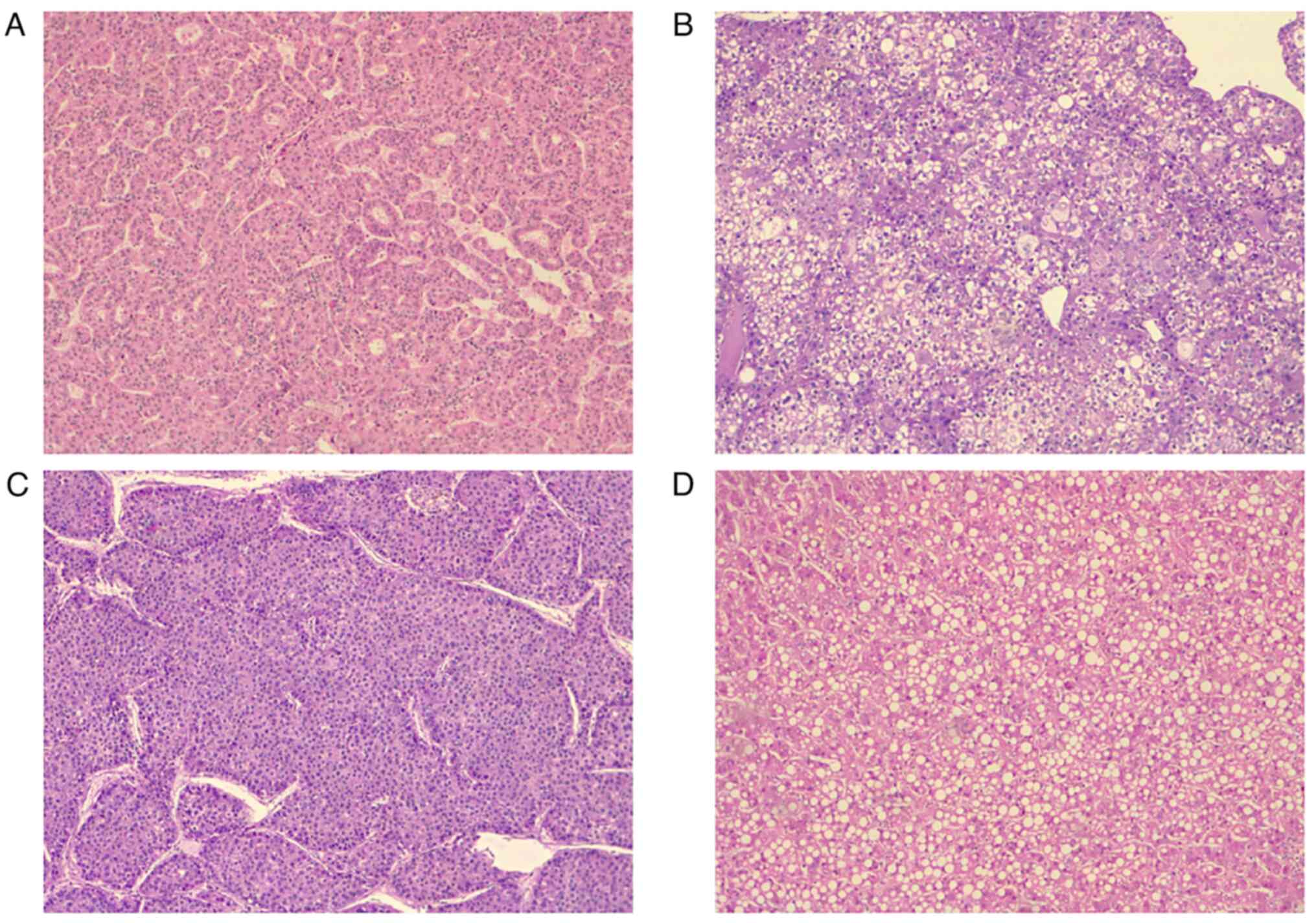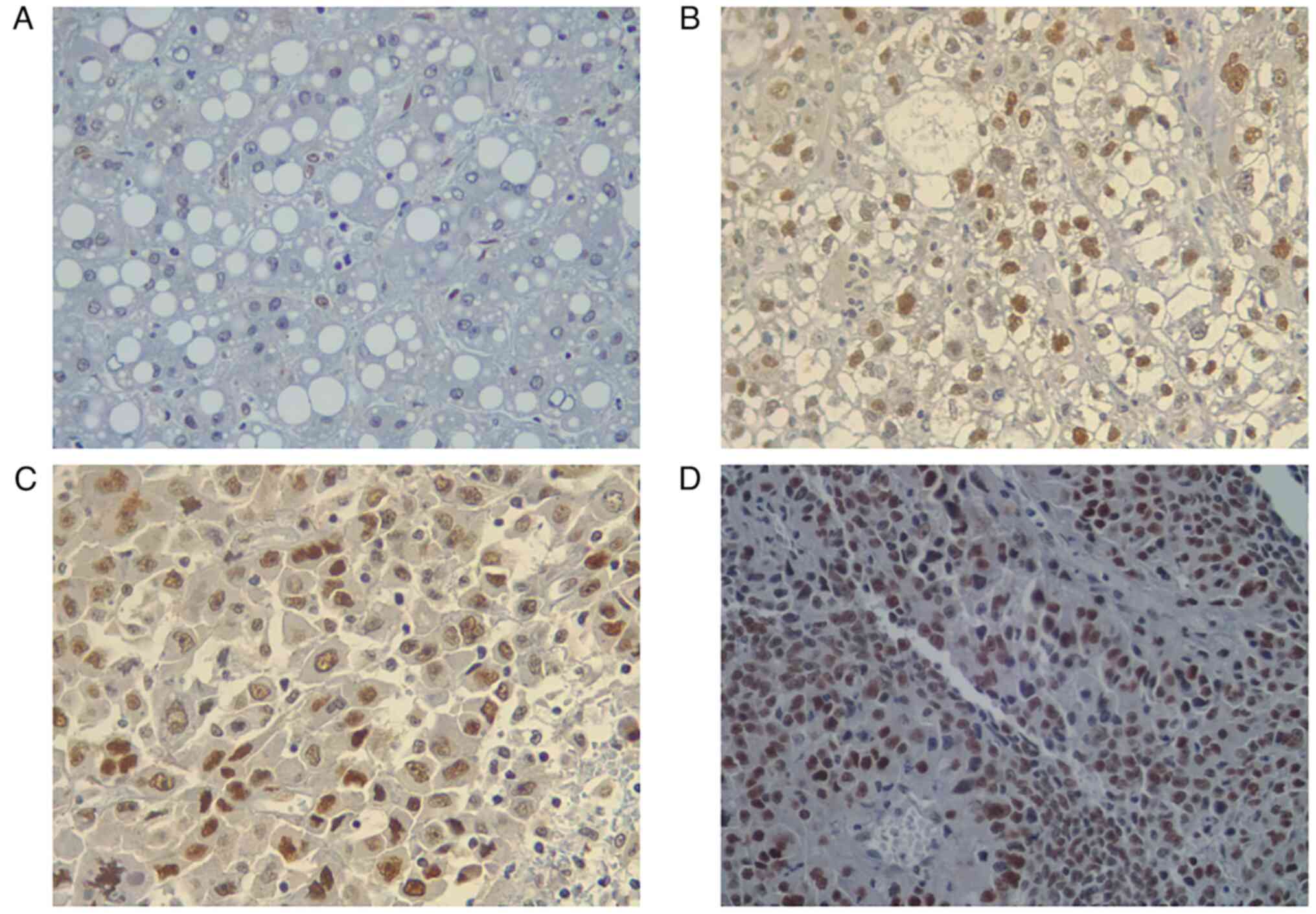|
1
|
Balogh J, Victor D III, Asham EH,
Burroughs SG, Boktour M, Saharia A, Li X, Ghobrial M and Monsour H:
Hepatocellular carcinoma: A review. J Hepatocell Carcinoma.
3:41–53. 2016.PubMed/NCBI View Article : Google Scholar
|
|
2
|
Sung H, Ferlay J, Siegel RL, Laversanne M,
Soerjomataram I, Jemal A and Bray F: Global cancer statistics 2020:
GLOBOCAN estimates of incidence and mortality worldwide for 36
cancers in 185 countries. CA Cancer J Clin. 71:209–249.
2021.PubMed/NCBI View Article : Google Scholar
|
|
3
|
Wang CY and Li S: Clinical characteristics
and prognosis of 2887 patients with hepatocellular carcinoma: A
single center 14 years experience from China. Medicine (Baltimore).
98(e14070)2019.PubMed/NCBI View Article : Google Scholar
|
|
4
|
Reveron-Thornton RF, Teng MLP, Lee EY,
Tran A, Vajanaphanich S, Tan EX, Nerurkar SN, Ng RX, Teh R,
Tripathy DP, et al: Global and regional long-term survival
following resection for HCC in the recent decade: A meta-analysis
of 110 studies. Hepatol Commun. 6:1813–1826. 2022.PubMed/NCBI View Article : Google Scholar
|
|
5
|
Loho IM, Hasan I, Lesmana CR, Dewiasty E
and Gani RA: Hepatocellular carcinoma in a tertiary referral
hospital in Indonesia: Lack of improvement of one-year survival
rates between 1998-1999 and 2013-2014. Asian Pac J Cancer Prev.
17:2165–2170. 2016.PubMed/NCBI View Article : Google Scholar
|
|
6
|
Takahashi Y, Dungubat E, Kusano H, Ganbat
D, Tomita Y, Odgerel S and Fukusato T: Application of
immunohistochemistry in the pathological diagnosis of liver tumors.
Int J Mol Sci. 22(5780)2021.PubMed/NCBI View Article : Google Scholar
|
|
7
|
Roberts LR: Biomarkers for hepatocellular
carcinoma. Gastroenterol Hepatol. 12:252–255. 2016.PubMed/NCBI
|
|
8
|
Marei HE, Althani A, Afifi N, Hasan A,
Caceci T, Pozzoli G, Morrione A, Giordano A and Cenciarelli C: p53
signaling in cancer progression and therapy. Cancer Cell Int.
21(703)2021.PubMed/NCBI View Article : Google Scholar
|
|
9
|
Kanapathipillai M: Treating p53 mutant
aggregation-associated cancer. Cancers (Basel).
10(154)2018.PubMed/NCBI View Article : Google Scholar
|
|
10
|
Georgakilas AG, Martin OA and Bonner WM:
p21: A two-faced genome guardian. Trends Mol Med. 23:310–319.
2017.PubMed/NCBI View Article : Google Scholar
|
|
11
|
Aubrey BJ, Kelly GL, Janic A, Herold MJ
and Strasser A: How does p53 induce apoptosis and how does this
relate to p53-mediated tumour suppression? Cell Death Differ.
25:104–113. 2018.PubMed/NCBI View Article : Google Scholar
|
|
12
|
Sabapathy K and Lane DP: Understanding p53
functions through p53 antibodies. J Mol Cell Biol. 11:317–329.
2019.PubMed/NCBI View Article : Google Scholar
|
|
13
|
Zhan P and Ji YN: Prognostic significance
of TP53 expression for patients with hepatocellular carcinoma: A
meta-analysis. Hepatobiliary Surg Nutr. 3:11–17. 2014.PubMed/NCBI View Article : Google Scholar
|
|
14
|
Ji YN, Wang Q and Xue J: TP53
immunohistochemical expression is associated with the poor outcome
for hepatocellular carcinoma: Evidence from a meta-analysis. Tumour
Biol. 35:1653–1659. 2014.PubMed/NCBI View Article : Google Scholar
|
|
15
|
Kan Z, Zheng H, Liu X, Li S, Barber TD,
Gong Z, Gao H, Hao K, Willard MD, Xu J, et al: Whole-genome
sequencing identifies recurrent mutations in hepatocellular
carcinoma. Genome Res. 23:1422–1433. 2013.PubMed/NCBI View Article : Google Scholar
|
|
16
|
Schulze K, Imbeaud S, Letouzé E,
Alexandrov LB, Calderaro J, Rebouissou S, Couchy G, Meiller C,
Shinde J, Soysouvanh F, et al: Exome sequencing of hepatocellular
carcinomas identifies new mutational signatures and potential
therapeutic targets. Nat Genet. 47:505–511. 2015.PubMed/NCBI View
Article : Google Scholar
|
|
17
|
Ho DWH, Lo RCL, Chan LK and Ng IOL:
Molecular pathogenesis of hepatocellular carcinoma. Liver Cancer.
5:290–302. 2016.PubMed/NCBI View Article : Google Scholar
|
|
18
|
Link T and Iwakuma T: Roles of p53 in
extrinsic factor-induced liver carcinogenesis. Hepatoma Res.
3:95–104. 2017.PubMed/NCBI View Article : Google Scholar
|
|
19
|
Liu J, Li W, Deng M, Liu D, Ma Q and Feng
X: Immunohistochemical determination of p53 protein overexpression
for predicting p53 gene mutations in hepatocellular carcinoma: A
meta-analysis. PLoS One. 11(e0159636)2016.PubMed/NCBI View Article : Google Scholar
|
|
20
|
Torbenson M, Ng I, Park Y, Roncalli M and
Sakamato M: Hepatocellular Carcinoma. In: WHO Classification of
Tumours: Digestive System Tumours. Vol 1. 5th edition.
International Agency for Research on Cancer, Lyon, pp229-239,
2019.
|
|
21
|
Azlin AH, Looi LM and Cheah PL: Tissue
microarray immunohistochemical profiles of p53 and pRB in
hepatocellular carcinoma and hepatoblastoma. Asian Pac J Cancer
Prev. 15:3959–3963. 2014.PubMed/NCBI View Article : Google Scholar
|
|
22
|
You J, Yang H, Lai Y, Simon L, Au J and
Burkart AL: AT-rich interactive domain 2, p110α, p53, and β-catenin
protein expression in hepatocellular carcinoma and
clinicopathologic implications. Hum Pathol. 46:583–592.
2015.PubMed/NCBI View Article : Google Scholar
|
|
23
|
Abdou AG, Abd-Elwahed M, Badr M, Helmy M,
Soliman EA and Maher D: The differential immunohistochemical
expression of p53, c-Jun, c-Myc, and p21 between HCV-related
hepatocellular carcinoma with and without cirrhosis. Appl
Immunohistochem Mol Morphol. 24:75–87. 2016.PubMed/NCBI View Article : Google Scholar
|
|
24
|
Felipe-Silva A, Wakamatsu A, dos Santos
Cirqueira C and Alves VAF: Immunohistochemistry panel segregates
molecular types of hepatocellular carcinoma in Brazilian autopsy
cases. World J Gastroenterol. 22:6246–6256. 2016.PubMed/NCBI View Article : Google Scholar
|
|
25
|
Graur F, Furcea L, Mois E, Biliuta A, Rozs
AT, Negrean V and Al Hajjar N: Analysis of p53 protein expression
in hepatocellular carcinoma. J Gastrointestin Liver Dis.
25:345–349. 2016.PubMed/NCBI View Article : Google Scholar
|
|
26
|
Li Z, Han C and Feng J: Relationship of
the expression levels of XIAP and p53 genes in hepatocellular
carcinoma and the prognosis of patients. Oncol Lett. 14:4037–4042.
2017.PubMed/NCBI View Article : Google Scholar
|
|
27
|
Park NH, Chung YH, Youn KH, Song BC, Yang
SH, Kim JA, Lee HC, Yu E, Lee YS, Lee SG, et al: Close correlation
of p53 mutation to microvascular invasion in hepatocellular
carcinoma. J Clin Gastroenterol. 33:397–401. 2001.PubMed/NCBI View Article : Google Scholar
|
|
28
|
Lalisang TJM, Moenadjat Y, Siregar NC and
Stephanie M: Overexpression of p53 in extra large (more than 10 cm)
hepatocellular carcinoma. Med J Indones. 27:71–75. 2018.
|
|
29
|
Roayaie S, Obeidat K, Sposito C, Mariani
L, Bhoori S, Pellegrinelli A, Labow D, Llovet JM, Schwartz M and
Mazzaferro V: Resection of hepatocellular cancer ≤2 cm: Results
from two Western centers. Hepatology. 57:1426–1435. 2013.PubMed/NCBI View Article : Google Scholar
|
|
30
|
Amin MB, Greene FL, Edge SB, Compton CC,
Gershenwald JE, Brookland RK, Meyer L, Gress DM, Byrd DR and
Winchester DP: The eighth edition AJCC cancer staging manual:
Continuing to build a bridge from a population-based to a more
‘personalized’ approach to cancer staging. CA Cancer J Clin.
67:93–99. 2017.PubMed/NCBI View Article : Google Scholar
|
|
31
|
Kamarajah SK, Frankel TL, Sonnenday C, Cho
CS and Nathan H: Critical evaluation of the American joint
commission on cancer (AJCC) 8th edition staging system for patients
with hepatocellular carcinoma (HCC): A surveillance, epidemiology,
end results (SEER) analysis. J Surg Oncol. 117:644–650.
2018.PubMed/NCBI View Article : Google Scholar
|
|
32
|
Bannasch P, Ribback S, Su Q and Mayer D:
Clear cell hepatocellular carcinoma: Origin, metabolic traits and
fate of glycogenotic clear and ground glass cells. Hepatobiliary
Pancreat Dis Int. 16:570–594. 2017.PubMed/NCBI View Article : Google Scholar
|
|
33
|
El Jabbour T, Lagana SM and Lee H: Update
on hepatocellular carcinoma: Pathologists' review. World J
Gastroenterol. 25:1653–1665. 2019.PubMed/NCBI View Article : Google Scholar
|
|
34
|
Calderaro J, Couchy G, Imbeaud S, Amaddeo
G, Letouzé E, Blanc JF, Laurent C, Hajji Y, Azoulay D, Bioulac-Sage
P, et al: Histological subtypes of hepatocellular carcinoma are
related to gene mutations and molecular tumour classification. J
Hepatol. 67:727–738. 2017.PubMed/NCBI View Article : Google Scholar
|
|
35
|
Qu JH, Zhu MH, Lin J, Ni CR, Li FM, Zhu Z
and Yu GZ: Effects of hepatitis B virus on p53 expression in
hepatoma cell line SMMU-7721. World J Gastroenterol. 11:6212–6215.
2005.PubMed/NCBI View Article : Google Scholar
|
|
36
|
Maloberti T, De Leo A, Sanza V, Gruppioni
E, Altimari A, Riefolo M, Visani M, Malvi D, D'Errico A, Tallini G,
et al: Correlation of molecular alterations with pathological
features in hepatocellular carcinoma: Literature review and
experience of an Italian center. World J Gastroenterol.
28:2854–2866. 2022.PubMed/NCBI View Article : Google Scholar
|
|
37
|
Marthins Filho SN, Paiva C, Azevedo RS and
Alves VAF: Histological grading of hepatocellular carcinoma-A
systematic review of literature. Front Med (Lausanne).
4(193)2017.PubMed/NCBI View Article : Google Scholar
|
|
38
|
Wang Z, Gou W, Liu M, Sang W, Chu H and
Zhang W: Expression of P53 and HSP70 in chronic hepatitis, liver
cirrhosis, and early and advanced hepatocellular carcinoma tissues
and their diagnostic value in hepatocellular carcinoma: An
immunohistochemical study. Med Sci Monit. 21:3209–3215.
2015.PubMed/NCBI View Article : Google Scholar
|
|
39
|
Duan X, Cai Y, He T, Shi X, Zhao J, Zhang
H, Shen Y, Zhang H, Zhang H, Duan W, et al: The effect of the TP53
and RB1 mutations on the survival of hepatocellular carcinoma
patients with different racial backgrounds. J Gastrointest Oncol.
12:1786–1796. 2021.PubMed/NCBI View Article : Google Scholar
|

















